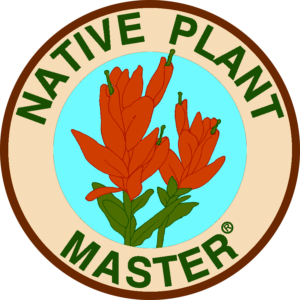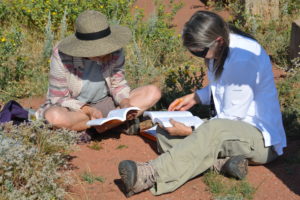From land use managers to artists, participants in the Colorado Native Plant Master program have increased their knowledge with on-the-ground learning opportunities. Participants include biologists, green industry personnel, land use managers, business owners, volunteers, educators, homeowners and others.
“Many residents are unfamiliar with native plants and invasive weeds in Colorado, so the program was designed to educate participants about sustainable landscaping choices and non-native weeds that can threaten native ecosystems,” said Barbara Fahey, natural resources Extension agent in Jefferson County, and founder of the program.
natural resources Extension agent in Jefferson County, and founder of the program.
Colorado is a dry state subject to periodic drought. The Native Plant Master program was created over 20 years ago to respond to inquiries about sustaining built and natural landscapes while minimizing the use of water and reducing the impact of invasive non-native weeds that can thrive in dry conditions.
“I had the opportunity to use native plants almost exclusively in my latest redesign for the parking lot and front area of a school in El Paso County”, said Karen Bishop, designer at Green Frolic Designs.
“Native plant landscapes provide areas that can increase biodiversity including native birds and beneficial insects”, said Ashley Stokes, CSU Assistant Vice President for Engagement and Deputy Director of Extension. “The Native Plant Master program has played a key role in improving our appreciation and knowledge of native landscapes and the value that they bring across Colorado.”
The program was first offered in 1997 by Colorado State University Extension in Jefferson County and since has been adopted in an additional 11 counties.
“As a result of my Native Plant Course I was able to teach many children about native plants, and explain to my community college students why they should not pick and eat edible landscape plants,” said Alicia Goddard, naturalist and outdoor environmental education specialist at Lory State Park in Larimer County. Goddard also collaborate on a native seed collection project with Wildland Restoration Volunteers and school service learning projects focused on invasive species removal.
“The native plant course assisted me with lesson planning to reach a broader more diverse audience, including the promotion of sustainable recreation through stewardship practices,” Goddard said.
 After two decades of experience with the program throughout Colorado, the program has attracted national as well as regional attention. “We’ve had quite a few inquiries from other states over the years and are hoping to build capacity to be able to expand the program nationally,” Fahey said. “This year, the University of Wyoming will be piloting the Native Plant Master program which is the first time it’s been offered outside Colorado.”
After two decades of experience with the program throughout Colorado, the program has attracted national as well as regional attention. “We’ve had quite a few inquiries from other states over the years and are hoping to build capacity to be able to expand the program nationally,” Fahey said. “This year, the University of Wyoming will be piloting the Native Plant Master program which is the first time it’s been offered outside Colorado.”
The latest survey results for the Colorado Native Plant Master® Program show that the impacts in just one year are diverse and communities and people benefit in various ways, including:
- 1,603 participants in classes offered by the program
- 2,543 hours were contributed by 172 volunteers for a donated value of $61,338
- 16,559 educational contacts made by volunteers
- $31,528 in savings reported by participants due to reduced landscaping inputs and increased land productivity
- 14,943 acres were impacted by sustainable landscaping or alien invasive weed control completed by program participants
- $27,807 in user fees split 75% to counties/25% to state program which supports program materials
- 23,030 web sessions on the Colorado Plant Database
The Colorado Plant Database provides researched-based information on the identification, ecology and human connections for more than 1,000 Colorado native plants as well as non-native invasive weeds. The database is used by the public as well as program participants. It was created in response to the need for information on native plants, their use in sustainable landscapes and alien invasive weeds that threaten native ecosystems. Sustainable landscaping can reduce the need for water which is critical in a drought-prone state and can decrease maintenance time and pesticide use. Control of noxious weeds can increase sustainability of natural landscapes.
Many partners are integral to the NPM program success, including the Colorado Natural Heritage Program, Colorado State Forest Service, Colorado Native Plant Society, Colorado Weed Management Association and Jeffco Parks. Agencies regularly send their staff to improve their plant knowledge.
“I have used the native plant master courses to relearn plant identification skills and incorporate information about native plants and pollinators in web sites and presentations to green industry and the public”, said Laura Pottorff, Program Manager, Plant Industry Division, Colorado Department of Agriculture.
To become involved in the Native Plant Master Program, visit www.conativeplantmaster.org.